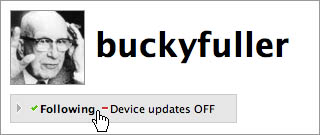
There are about a dozen people I follow on Twitter whom I’ve never actually met (or whom I’ve met only briefly) but who after months of exchanging tweets I can honestly call good friends.
In other words, we have formed our friendships completely on Twitter, from scratch. This is probably happening to a lot of people, too. Maybe even you (if you use Twitter).
You might follow someone you don’t really know for any number of reasons: You may have seen the person’s name in another friend’s tweet and thought that they sound interesting. You may want to follow a well-known peer. You may have met someone in passing in real life and wished you could hang out more with them, so you search for them on Twitter. You may look at other people’s follow lists and decide that whoever they follow you should follow.
A mutual friend may even make an introduction by simply suggesting “you should follow @johndoe” — which is kind of like saying “you should meet John Doe” except that, because Twitter is basically one-way, the other person isn’t obliged to acknowledge or participate in any formal introduction.
It’s a kind of passive introduction network, where by “following” someone and monitoring their lives (and their conversations with other tweeple) you can get to know them fairly well before actually engaging them in @name public conversations, and eventually in d name direct message conversations.
This probably happens on other social networks, too (for example on Facebook’s walls where you can peek into the conversations of other users and find people you would like to meet), but because most social networks require mutual approval of friendship links, the friend-making dynamic is fraught with a far more emotional and social complexity. Twitter’s fundamental one-way nature lightens the emotional load of making new friends in ways that most other networks just can’t do.
Comments
3 responses to “I’m Delighted to Tweet You!”
Hey, well-known peer 🙂
A question: how do you decide whether to follow someone or not? Does it depend on how you came to know about them? Their recent tweets? Their following/followers numbers? Or all of the above?
Cheers, Martin
Looks like it’s be interesting to study how twitter users are motivated to follow one another. It shouldn’t be too different from social networks such as Facebook, where attraction would be attributed potential followers observing one’s personal presentation as well as pre-existing conversations with others.
Totally agree. Twitter to me is a like being at a very large conference — following is just a way to wander into, and hopefully join a conversation without drawing the immediate levels of attention or need-to-entertain that happens in those situations IRL. Hence the “passive introductions.”
It’s definitely more of an acquaintance network. Friendships surface from the actual conversations using the system and are not embedding into some parameters or attributes of the system itself. It makes for a simpler system, but you don’t get those awkward social moments you describe when you need to change your relationship status, or “unfriend” someone, etc.. I think that speaks a lot to Twitter’s repeated statement that they want to be a communications medium and not a true social network, which I’m absolutely behind — we have more than enough SNSes as it is.
But I’m also from the old BBS days, so this kind of thing isn’t new to me. BBS meetups was the very first documentaries I made in film school. Before that, there were a few C64 and IIGS pirate groups I knew in NYC and we met several times as well. The problem then was that because of the early age of tech, once a BBS went down for whatever reason, it was nearly impossible to find a way to connect again unless you exchanged real information. Too often we relied on the board for all of our regular communications, and there were no fail-safes when they went down. Nor was there Google to track them down later. 🙂